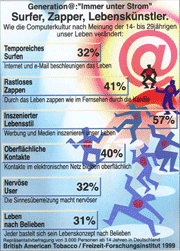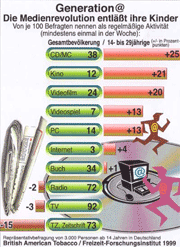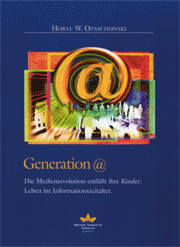Generation @
Surfer. Zapper. Free spirit.
British American Tobacco's research institute publishes comprehensive study on life in the information age
At the turn of the millennium, the first media revolution produced its offspring. Never before has there been a generation that grew up with electronic media from childhood and whose outlook on life has been so profoundly shaped by them as those aged 14 to 29 today. Amidst TV, PCs, email, and the internet, a new generation is emerging under the sign of @ (pronounced: ett): "Generation @." They surf the globe in 90 seconds, make phone calls in every situation, channel surf like television, are constantly buzzing with energy, and often get on the nerves of those around them. This is the gist of the findings from extensive representative surveys conducted by the Leisure Research Institute of British American Tobacco. Between September 1998 and April 1999, 3,000 people aged 14 and older were interviewed about their lifestyle, consumption, and media habits.
Generation @:
""Always on the go" – the home as a pit stop
In his latest book, "Business @," Bill Gates explores the impact of information technology on the business world. Professor Dr. Horst W. Opaschowski, the scientific director of the Hamburg Institute and author of the new futures study, asks, however: What will life be like in the information age? "Generation @ – that's the generation that already plays and learns with computers and practices a new way of life," is one of Opaschowski's theses. "An electronically shaped lifestyle is emerging that could revolutionize everyday life as profoundly as the invention and spread of electricity did a hundred years ago." Representative survey results from the Leisure Research Institute of British American Tobacco indicate that the generation of today's 14- to 29-year-olds, fearing they are missing out on something in life, restlessly lives according to the experience formula "life minus boredom," even if this sometimes resembles a secondhand life.
A clear majority of young people (57%) now believe that "advertising, media, and computer culture increasingly stage our lives and shape our lifestyles." On the stage of life, many young people act like staged performers: they believe they are living and are being lived. They turn themselves into harried actors who feel they are constantly late.
Those aged 14 to 29 want to see, hear, and experience everything, and above all, not miss out on anything in life. They spend almost as much time watching television (89%) and listening to the radio (70%) as the rest of the population (TV: 92% – Radio: 72%). In addition, and often simultaneously, they use other media: They watch significantly more videos (44% – total population: 24%) and also spend more time listening to CDs (63% – total population: 38%). One in four young people also uses a computer (27% – total population: 14%), and one in five enjoys video games (20% – total population: 7%). And they even still find time for reading books (35% – total population: 34%). The question "What first?" Or, "How much of what?" is answered by the stressed young generation in their time crunch with time management: More activities are "packed" and accommodated into the same amount of time, performed quickly or done simultaneously.
A study recently published by British American Tobacco demonstrates that the media competition for "PC instead of TV" is not taking place among "Generation @". For them, the internet is like an additional new media channel: Web events are now added to TV events. There is no sign of a shift away from television.
The children of Karl Marx and Coca-Cola have now become the children of Walt Disney and Bill Gates. Growing up in a culture between Mickey Mouse and Microsoft, VIVA and MTV, two out of five young people (41%) are convinced that people will soon "channel surf through their lives like they already do through television channels." In the future information age, they will be everywhere in the world, but at home nowhere. Opaschowski: "Home will become a pit stop, the world a global village. Surfing the world could ultimately make you homeless.""
Virtual contacts:
Non-existent relationships
The social consequences are already evident. "Generation @" drifts through life, living a temporary existence and rarely finding peace. The buzzword at the turn of the millennium is communication. But in reality, the younger generation rushes from one communication to the next, making more contacts than they actually talk to each other. New information technologies are causing an almost inflationary proliferation of contacts via email, answering machines, and fax machines, which is also affecting the intensity of very personal relationships within families and circles of friends. "Generation @ is building new electronic relationships in the labyrinth of chat boxes and emails – friendly networks that are free of obligations," says Professor Opaschowski.
However, two out of five young people (40%) admit self-critically: "Contacts in the electronic network remain superficial and cannot replace lasting relationships." They can "better avoid" the weaknesses of their contacts via the internet. Shared experiences are replaced by temporary alliances or pragmatic, short-term relationships.
""Marriage – no thanks?""
A turnaround is possible
The social developments of recent years initially do not suggest a trend reversal at the turn of the millennium: fewer and fewer marriages, fewer and fewer children, fewer and fewer families in Germany. Will this trend soon reverse? A comparison of the 1980s and 1990s reveals the first signs of a change in this trend.
For a decade, young people aged 14 to 29 behaved like "hegoists"—that is, they were both hedonists and egoists. They wanted to be free and independent, have plenty of time "for themselves," and simply live happily without having to think about marriage and family. The conviction spread: "Friends, sports, hobbies, and vacations are more important to me than marriage and starting a family" (1985: 46% – 1988: 49% – 1994: 54%). Shortly before the turn of the millennium, the beginnings of a shift in sentiment became apparent. A change in the trend is possible, even though roughly half (1999: 53%) still voted for enjoying life without regard for family. Skepticism is certainly warranted, because such a fundamental change in attitude can only develop slowly and doesn't happen suddenly overnight. Early signs indicate that the motto of the eighties, "consumption instead of children," is no longer being adopted unquestioningly by "Generation @".
Multiple personalities:
Pretending to be someone you're not really you
"Generation @" lives in the new computer world. They are getting used to trying out simulated environments. Internet users, in particular, enjoy role-playing and changing roles. Many young people pretend to be older than they actually are in chat rooms. The internet is becoming a stage where young people can both play and rehearse their lives. Nearly a third of the younger generation believes: "On the internet, you can play a role yourself" (31%), meaning you can embody personality types without having to live them permanently.
""Generation @" is the vision of the next generation, already evident in the lifestyle of 14- to 29-year-olds. Everything is freely available. But if everything seems arbitrary, then, according to roughly one in three young people (31%), "everyone has to create their own life concept and search for meaning in life." The life concept is freely available: Meaning in life is individualized because there is a lack of secure orientations and valid standards of value. The future also belongs to individually crafted existences.
""Just do it":
Spontaneous willingness to help, but no long-term commitments
The fast-paced and accelerating rhythm of life also affects social behavior. A generation raised with information overload and sensory overstimulation increasingly tends to block out everything that is not relevant to their personal goals. They often lack both the time and the patience to care for people who don't play a central role in their lives. Even social engagement must answer the question for young people: What's in it for me?
Professor Opaschowski: "In the future, there is no threat of social illiteracy, but rather a spontaneous willingness to help, in which helpers themselves determine the why, what for, and how long of their commitment, instead of being obligated." Therefore, anyone who wants to attract more of the younger generation to take on voluntary tasks must set different priorities in their communication and advertising and adapt to "their" conditions. For example, 14- to 29-year-olds certainly signal a willingness to help and also give "good reasons" for unpaid voluntary work in social organizations: They want to have the feeling of an "important life task" (36%) and help with the conviction that they are truly "needed" (36%). However, what motivates them even more to engage in social work is the associated opportunity to "make friends" (42%).
The "Generation @" is setting an example for a new culture of helping after the turn of the millennium: they want to help – voluntarily, autonomously, and out of joy. Helping for fun, not helping out of obligation. The much-criticized image of the "I don't care" generation is contrasted by the "just-do-it" generation, which offers hope for the future.
See also directory of all publications





